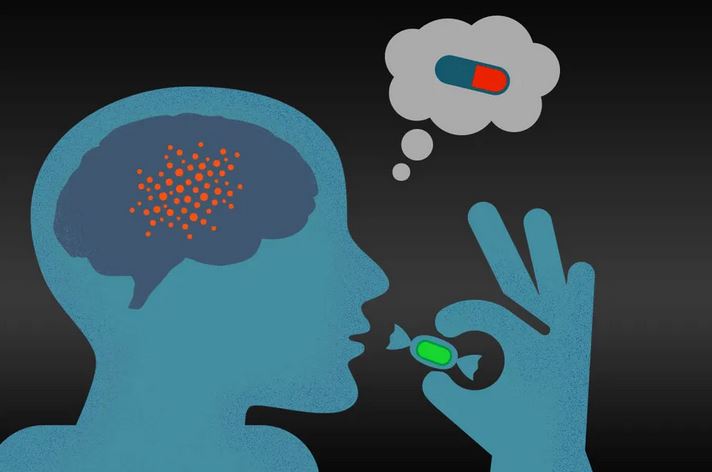The Placebo Effect - 2 Key Takeaways
The power of belief and expectation of an outcome regardless of the lack of any substance to that belief or expectation.
What The Placebo Effect Is And What It Isn't
Traditionally, the placebo effect occurs when false, or dummy, treatments of inert substances [that appear to be real but aren't] are administered during trials on new drugs, and patients still see their symptoms improve.
The objective is to compare the effect of the new drug on the
sample of patients who received it with a sample who received the
placebo and also with a further sample who received no treatment.
As
a broad generalisation the placebo effect takes place with
approximately 30% of the sample to who it was administered. This means
that about 1 in 3 people report that they are feeling better after they
have received a placebo. However this has increased to 60% in certain recent drugs trials.
The
word placebo is Latin for "I will please" and this provides the key to
understanding what it is and what it isn't.
The power and the benefit of the placebo lies in how it makes people feel.
Placebo is about feeling it is not about healing.
If it meant healing the word would be Sanabo for "I will heal". Steven Ross Pomeroy, editor of "RealClearScience" says quite emphatically that:
'The placebo effect is mistakenly viewed as the "power of positive thinking" creating a physiological healing process triggered by belief or expectation, when in reality it is an improvement in perceived symptoms.'
You can not cure cancer or heal a broken leg with a placebo, but it might ease the pain and suffering associated with these conditions.
What Creates The Placebo Effect?
The placebo effect is at the interface of biology and psychology.
McGill University pain researcher Jeffrey Mogil offers a more nuanced perspective:
“The placebo effect is the most interesting phenomenon in all of science, it’s at the precise interface of biology and psychology...
Placebos seem to have the greatest power over symptoms that lie at the blurred boundary between the body and the mind.
The placebo effect is about all the other surrounding stuff that accompanies the placebo.
Ted Kaptchuk at Harvard Medial School, who is regarded as one of the world’s leading experts on the placebo effect, said in a recent interview that the study of the placebo effect is about:
“...finding out what is it that’s usually not paid attention to in medicine — the intangible that we often forget when we rely on good drugs and procedures. The placebo effect is a surrogate marker for everything that surrounds a pill. And that includes rituals, symbols, doctor-patient encounters.”
Some of these factors include:
- Regression to the mean - In the natural course of any illness, symptoms may get better all on their own without any medical intervention.
- Confirmation bias - People pay more attention to signs that they’re getting better and ignore signs that they’re getting worse.
- Expectations and learning - When we take an active drug, we often feel better which creates a memory we revisit and recreate when taking a placebo.
- Pharmacological conditioning - Incredibly, the brain can learn to associate taking a pill with relief, and produce the same brain chemicals when the real drug is replaced with a placebo.
- Social learning- When people see others getting relief from a placebo treatment they have a greater placebo response when they undergo similar placebo treatment. In my personal opinion this is why some people derive benefit from homeothapy.
- Human connection - A caring and empathetic provider can create a stronger placebo response than an apathetic one. Factors as warmth, empathy, duration of interaction, and the communication of positive expectation can all create a stronger placebo effect.
The Wider Impacts Of The Placebo Effect
Traditionally we usually think of the placebo effect in the context of various medical interventions and treatments, and we associate the benefits with pain relief and feeling better.
However, there is growing evidence that the effect can also work in other ways:
- Enhancing our physical and mental performance
- Boosting creativity
- Enhancing cognitive functions
Dr Christian Jarrett has written an informative article with references and resources that explore the wider impacts of the placebo effect:
The Placebo Effect Digested - 10 Amazing Findings
The Placebo Effect - 2 Key Takeaways
[1] The Power of Expectation
The placebo effect is based on the power of belief and expectation of an outcome regardless of the lack of any substance to that belief or expectation.
This is not magical thinking, but the interaction of your mind and body and the positive neurological benefits that can be generated by your belief and expectation.
How you feel has a major effect on how you think and behave.
How you think and behave has a significant effect on the quality of your response to the events in your life.
It is the cumulative effect of your response to the events in your life that shape your long term life experience.
Put simply, the stronger your response to events - the better the outcome.
[2] The Power of Empathy And Compassion
We are all susceptible to people who are persons of direct influence in our lives.
Considerable research into the placebo effect has shown how the power of empathy and compassion from a person of direct influence in someone's life can reinforce and support a positive belief and expectation.
How you make someone else feel can have a significant effect on how they think and behave and thus have a significant effect on the quality of their response to the events in their life.
Compassion is an important aspect of living a balanced life, not only is it good for the other person, it is good for you - it is in your self interest.
Return from "Placebo Effect" to: Cognitive Distortions
LATEST ARTICLES
The Kingdom Is Here, Now Awakening Is Not Later -
 What contemplative traditions point to - and how progress quietly replaces presence. Across contemplative traditions, a strikingly consistent message appears: truth is not somewhere else, not in the…
What contemplative traditions point to - and how progress quietly replaces presence. Across contemplative traditions, a strikingly consistent message appears: truth is not somewhere else, not in the…Does Prayer Work? The Psychology of Prayer, Meditation and Outcomes
 Reality Is A Complex System Of Countless Interactions - Including Yours. So does prayer work? The problem is that the question itself is usually framed in a way that guarantees confusion. We tend to a…
Reality Is A Complex System Of Countless Interactions - Including Yours. So does prayer work? The problem is that the question itself is usually framed in a way that guarantees confusion. We tend to a…Living in Survival Mode Without Surrendering Mental Authority
Living in Survival Mode Without Surrendering Mental Authority
 Clear Thinking When You’re Just Trying to Stay Afloat. Many people today are overwhelmed because they are living in survival mode - not temporarily, but as a persistent condition of life. For many, th…
Clear Thinking When You’re Just Trying to Stay Afloat. Many people today are overwhelmed because they are living in survival mode - not temporarily, but as a persistent condition of life. For many, th…Manifestation Without Magic: A Practical Model
 Manifestation without magic is not a softer or more intellectual version of popular manifestation culture. It is a different model altogether. Popular manifestation teachings tend to frame reality as…
Manifestation without magic is not a softer or more intellectual version of popular manifestation culture. It is a different model altogether. Popular manifestation teachings tend to frame reality as…Staying Committed When You Can't See Progress - The Psychology of Grit
 Uncertainty Is Not The Absence Of Progress, Only The Absence Of Reassurance. One of the most destabilising experiences in modern life is not failure, but uncertainty and staying committed when you can…
Uncertainty Is Not The Absence Of Progress, Only The Absence Of Reassurance. One of the most destabilising experiences in modern life is not failure, but uncertainty and staying committed when you can…The Battle For Your Mind - How To Win Inner Freedom In A Digital Age Of Distraction
 From External Events to Inner Events. We often think of “events” as things that happen out there: the traffic jam, the rude comment, the delayed email reply. But what truly shapes our experience is wh…
From External Events to Inner Events. We often think of “events” as things that happen out there: the traffic jam, the rude comment, the delayed email reply. But what truly shapes our experience is wh…How to See Your Thoughts Without Becoming the Story
 A Practical Guide to Thought-Awareness. You can spend your life inside the stories of your mind without ever learning how to see your thoughts clearly and objectively. Most of the stuff we tell oursel…
A Practical Guide to Thought-Awareness. You can spend your life inside the stories of your mind without ever learning how to see your thoughts clearly and objectively. Most of the stuff we tell oursel…The Collison Decision Matrix - A Simple Framework for Better Choices
 The Collison Decision Matrix Is A Practical Everyday Thinking Tool. Most of us spend a surprising amount of time worrying about decisions. From small ones such as what to wear, what to eat, what to te…
The Collison Decision Matrix Is A Practical Everyday Thinking Tool. Most of us spend a surprising amount of time worrying about decisions. From small ones such as what to wear, what to eat, what to te…The Power Of Asking The Right Question
 The Power Of Asking The Right Question Lies In The Quest For Insight. To experience the power of asking the right question you must develop the practice of asking questions. The best way to improve th…
The Power Of Asking The Right Question Lies In The Quest For Insight. To experience the power of asking the right question you must develop the practice of asking questions. The best way to improve th…Site Pathways
 Here is a site pathway to help new readers of Zen-Tools navigate the material on this site. Each pathway is based around one of the many key themes covered on this site and contain a 150 word introduc…
Here is a site pathway to help new readers of Zen-Tools navigate the material on this site. Each pathway is based around one of the many key themes covered on this site and contain a 150 word introduc…How To Live With Contradiction - Beyond Thought Let Stillness Speak
 A major impact on so many peoples' lives is the situational contradiction of unfilled realistic expectations. So where does all this leave us? Well here we are, with mental equipment that is more lim…
A major impact on so many peoples' lives is the situational contradiction of unfilled realistic expectations. So where does all this leave us? Well here we are, with mental equipment that is more lim…
